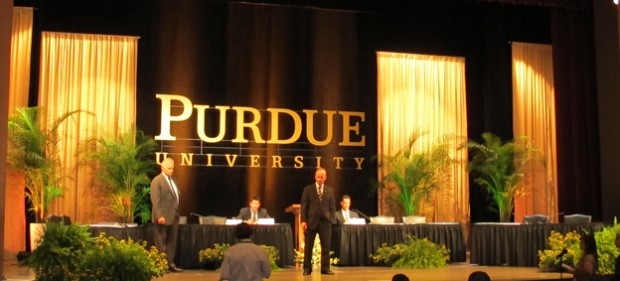The Trickiest Question About Daniels' Hire: Can He Lobby For Purdue?

Elle Moxley / StateImpact Indiana
Mitch Daniels takes media questions from the stage of Purdue's Loeb Playhouse following the announcement he would become the school's next president.
As we’ve pointed out, many politicians — indeed, even a few former governors — have preceded Gov. Mitch Daniels in switching from politics to the presidency of a major university.
But taking the top job at Purdue poses a particularly sticky question for Daniels: Can he lobby the General Assembly on Purdue’s behalf without entangling himself in a conflict of interest or without breeching Indiana laws (which he helped create) governing former state lawmakers?
At a news conference Friday, Daniels said he couldn’t answer that question just yet. From the AP:
Daniels said Friday he wasn’t sure whether he could press members of the General Assembly on the university’s behalf because state ethics rules require a one-year “cool down” for public officials after leaving office. If the law is unclear, he said he would “lean” against lobbying in his first year at Purdue.
“If anything, I’m going to lean on the side of extra caution. If that means someone else tells the story down here tells the story for at least a year, that’s what it means,” Daniels said, motioning to Indianapolis.
Daniels instituted Indiana’s “cooling off” or “revolving door” law in 2005.
The law forbids any former member of the Indiana General Assembly from being “registered as a lobbyist… or employed as a legislative liaison” for one full year after his term ends, according to the National Conference of State Legislatures. There are also similar restrictions for other “former state officers, employee, or special state appointees.”
But as Indianapolis Star columnist Matthew Tully writes, the question about whether Daniels’ hire creates a conflict of interest — as some of the most vocal critics of Purdue’s presidential choice charge — is still legitimate.
“It does seem strange that Daniels was hired by a board filled largely with people he appointed,” he says. “The issue is mitigated by the fact that landing Daniels is a huge boost to, and a dream hire for, the school.”
Lessons of History?
In 2010, Daniels dealt with a controversy involving revolving door laws when the governor fired Indiana Utility Regulatory Commission lawyer Scott Storms after discovering Storms presided over hearings involving Duke Energy while pursuing employment at the utility company.
The media coverage from that debacle could provide hints about how state officials might settle a conflict-of-interest question about Daniels’ move to Purdue.
This 2010 story from the Indianapolis Business Journal criticizes the Indiana State Ethics Commission, charged with enforcing the revolving door laws, for being too lenient:
An IBJ review of 27 rulings by the Indiana State Ethics Commission dating back to 2006 shows the five-member body has not prohibited a state employee from taking a private-sector or not-for-profit job in the last 4-1/2 years.
On only a few occasions has the panel, which advises state employees on ethics laws, required a 365-day “cooling off” period between jobs.
Ethics experts said, in some of the cases, the commission should have more strictly interpreted state law regarding employment restrictions.
Gary Welsh at Advance Indiana put it another way in 2010: “Indiana’s revolving door law has no teeth.”


